
Common name:Kleinia
Botanical name:Senecio mandraliscae
This succulent perennial will grow to about 1.5' tall and 2' wide. It has curved, bluish gray leaves that are about 3.5" long and very slender.
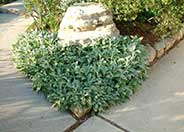
Common name:Lamb's Ears
Botanical name:Stachys byzantina
This tiny, herbaceous shrub will grow less than 1' tall and has medium sized, grayish green leaves with blue and lavender flowers that bloom in the spring.
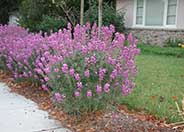
Common name:Bowles Mauve Wallflower
Botanical name:Erysimum 'Bowles Mauve'
This shrubby evergreen perennial reaches a size of 3' tall and 6' wide with narrow, dark foliage and a dense habit. Its flowers always emerge as mauve purple, and are produced on 4' tall stalks. It blooms throughout warm months but can bloom continuously in mild climates. It should receive sun to part shade, with little or no summer watering. It is hardy to frost.
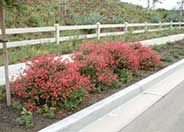
Common name:Red Star Autumn Sage
Botanical name:Salvia greggii 'Red Star'
This shrub will grow 1'-4' tall and 1'-4' wide. It has glossy green leaves with red flowers that bloom from fall to spring.
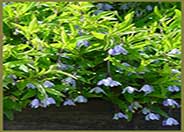
Common name:Australian Bluebell Creeper
Botanical name:Sollya heterophylla
The Australian Bluebell Creeper is a spreading evergreen shrub that grows 2'-3' tall, or a climbing vine that grows to 8' tall with support. It has attractive, glossy green foliage and blue, bell-shaped summer flowers. This shrub can tolerate full sun on the coast and part shade inland. It can grow under Eucalyptus trees, and needs good drainage. The Australian Bluebell Creeper is also drought tolerant. -Cornflower Farms
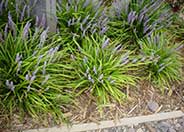
Common name:Big Blue Lily Turf
Botanical name:Liriope muscari
Grass-like clumps of dark green leaves 1" wide up to 18" long are found on the Liriope muscari. It can reach a height of 12"-15", and dark blue flowers spikes can be seen held above the leaves during the summer. This is an excellent border, accent or ground cover plant that requires part shade exposure.
Designer: Terry Gardner
Photographer: GardenSoft
Maintain a two to four inch layer of mulch on the soil surface to reduce weeds, infiltrate rain water, and reduce compaction.
Drip and other smart irrigation delivers water directly to roots, allowing no excess water for weeds.